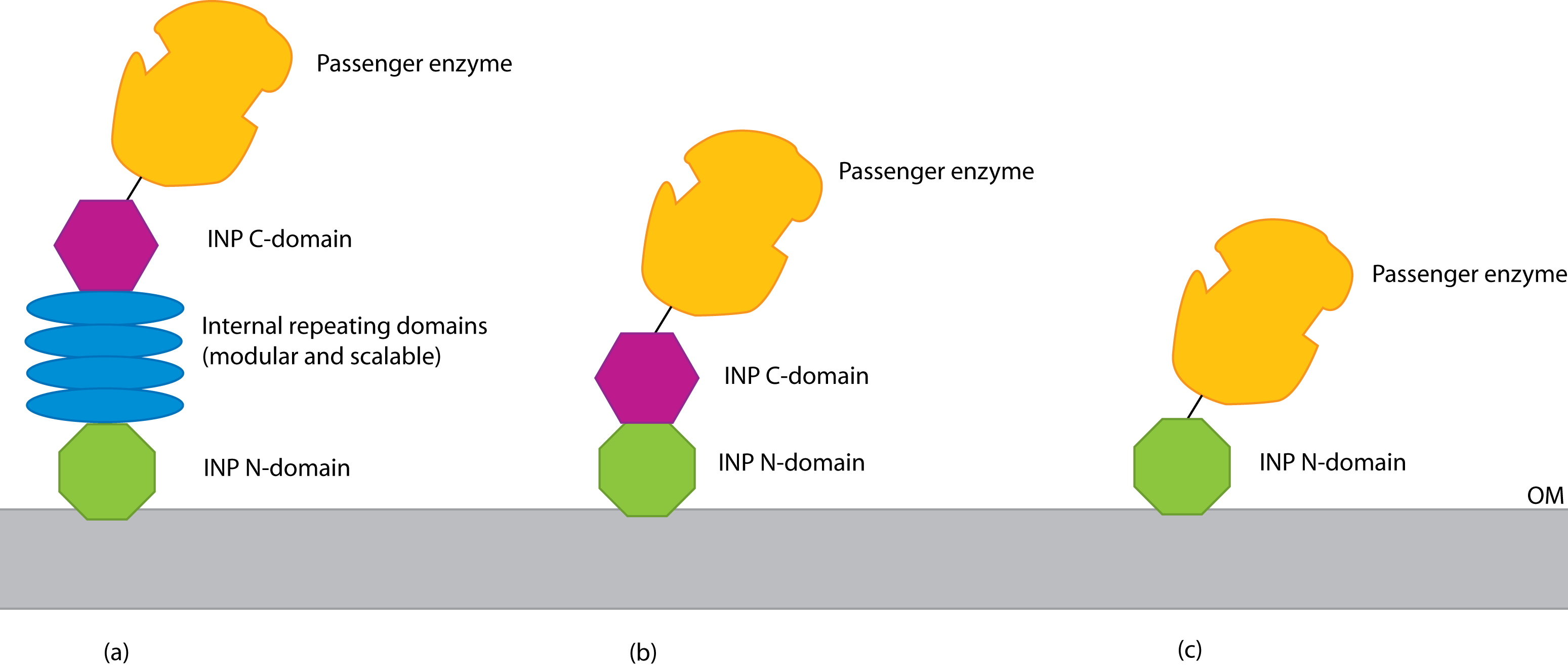Team:Edinburgh/Cell Display
From 2011.igem.org
| Line 5: | Line 5: | ||
}); </script></html> | }); </script></html> | ||
<div class="main_body"> | <div class="main_body"> | ||
| - | + | ||
An obvious type of bioreactor is an ''E. coli'' cell that displays the desired proteins on its outer membrane. This type of display is called '''cell surface display'''. | An obvious type of bioreactor is an ''E. coli'' cell that displays the desired proteins on its outer membrane. This type of display is called '''cell surface display'''. | ||
Revision as of 11:01, 17 July 2011
An obvious type of bioreactor is an E. coli cell that displays the desired proteins on its outer membrane. This type of display is called cell surface display.
This works by fusing the proteins of interest to carrier proteins which are naturally found on the outer membrane.
Contents |
Outline
Berkeley 2009 (who made these Parts) tried several many carrier proteins with many passenger enzymes, and had success in many areas. However, when they tried attaching cellulases, they weren't so successful - of the two quantified cellulases, one worked just as well without the carrier (Cel5b) and the other didn't work (Cel9a, as compared to negative control).
We will try a different carrier. <partinfo>BBa_K265008</partinfo> by UC Davis 2009 is a synthetic, codon-optimised sequence, based on [http://www.ncbi.nlm.nih.gov/nuccore/AF013159 GenBank AF013159] and coding for the first 211 and last 97 amino acids of ice nucleation protein (INP, normally coded by the inaK gene) from [http://en.wikipedia.org/wiki/Pseudomonas_syringae Pseudomonas syringae]. It seems promising as a carrier of enzymes. [http://www.sciencedirect.com/science/article/pii/S016777991000199X Van Bloois et al (2011)] speak highly of INP. Fusions are carried out at the INP C terminal.
INP has major domains at its N and C terminals, as well as a number of internal repeating domains. There seem to be three strategies for using INP (see figure):
- Use the entire INP protein; fuse at the C terminal
- Delete the INP internal domains; fuse at the C terminal
- Delete all of INP except the N domain; fuse at the new C terminal
<partinfo>BBa_K265008</partinfo> should be suitable for the 2nd strategy.
Linkers
It may be desirable to create linkers between the carrier and the protein of interest. BioSandwich could be ideal for this.
Example system
A complete 3 cellulase system would contain:
- Promoter -- RBS -- <partinfo>BBa_K265008</partinfo> -- Linker? -- <partinfo>BBa_K392006</partinfo>
- Promoter -- RBS -- <partinfo>BBa_K265008</partinfo> -- Linker? -- <partinfo>BBa_K392007</partinfo>
- Promoter -- RBS -- <partinfo>BBa_K265008</partinfo> -- Linker? -- <partinfo>BBa_K392008</partinfo>
Notes on genetic instability
The comments on the Phage Reactor page also apply here: there is a potential for genetic instability due to the presence of repeated sections of DNA in the system. However, this will not be a problem for our JM109 lab strain, which lacks an important recombinase. As for the use of this technology in industry, it will be possible to overcome this problem simply by synthesising coding sequences with as many altered (but synonymous) codons as possible.
Notes for flagellar display
Flagellar display could conceivably be used to focus our enzymes into a more concentrated space, perhaps increasing synergy and efficiency. However, it is a trickier technology...
The fusion is done as an insertion into the fliC protein. This may be problematic in practice. I'm not sure this technology has been used for full proteins. [http://peds.oxfordjournals.org/content/10/11/1319.full.pdf+html Westerlund-Wikstrom et al (1997)] managed a 302 peptide insertion.
References
- Van Bloois E, Winter RT, Kolmar H, Fraaije MW (2011) [http://www.sciencedirect.com/science/article/pii/S016777991000199X Decorating microbes: surface display of proteins on Escherichia coli]. Trends in Biotechnology 29(2): 79-86 (doi: 10.1016/j.tibtech.2010.11.003).
- Westerlund-Wikstrom B, Tanskanen J, Virkola R, Hacker J, Lindberg M, Skurnik M, and Korhonen TK (1997) [http://peds.oxfordjournals.org/content/10/11/1319.full.pdf+html Functional expression of adhesive peptides as fusions to Escherichia coli flagellin]. Protein Engineering 10(11): 1319-1326.
 "
"
